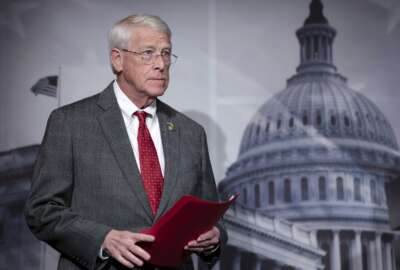Some final thoughts from one of the leading reformers of Congress
"Congress as an institution has seen tremendous turnover. It has struggled to recruit and retain and develop staff," said Derek Kilmer.
After years of working to reform Congress, my next guest can look back at some real accomplishments. And work still to be done. Representative Derek Kilmer of Washington, spearheaded the Select Committee on the Modernization of Congress which became the House Administration Subcommittee on Modernization. Now he’s retiring from Congress. Derek Kilmer joined the Federal Drive with Tom Temin.
Interview Transcript:
Tom Temin My first question is you are 50, if you don’t mind my saying, since you’ve got a Wikipedia page, so anyone can find that out. Five terms and you’re not running for Senate. Is it because you’re going to run for governor of Washington? Who leaves at this point in a congressional career?
Derek Kilmer At the end of this term, I will have spent 12 years in Congress, eight years in the Washington state legislature. And 20 years of elective office just felt about right to me. I look at life as a series of chapters, and it struck me, if I’m going to have another chapter, it has to start eventually. So it felt like the right time. And I’m excited about what comes next.
Tom Temin And in leaving Congress, you have spearheaded, as I put it, led that committee and some reforms really happened. The division, let’s put it in Congress. That’s something that seems like reform can’t overcome. What are your thoughts on the ability to talk past cable news and really engage with one another? Is that still something that could happen?
Derek Kilmer Well, I think we showed on the modernization committee that if you focus on trying to solve problems rather than trying to score points, you can really make progress without a lot of fanfare and with virtually zero cable news attention. Our committee passed over 200 recommendations focused on making Congress work better for the American people. About half of those recommendations have been implemented another quarter or in the process of being implemented and a quarter we’re trying to get out of the parking garage. I’m conscious, as I say, that that people could look at the state of things in Congress and say well bang up job. All right, clearly, Congress is fixed. But my perspective on it is a little bit informed by an interaction I had with the House chaplain during the 15th vote for Speaker of the House when the chair was vacated. I looked at her on the House floor and I said to her, pray harder. And she put her hand on my elbow and she said, just imagine how messed up this place would be if I wasn’t praying so hard. And that’s sort of how I look at the work of the Modernization Committee. We have implemented recommendations that I think are already bearing fruit for the institution, and there are some things we’re laying seeds that I think over time will make a really constructive difference on behalf of the institution of Congress and on behalf of the American people the Congress is intended to serve.
Tom Temin And just as the chaplain loves all of her flock, you probably are pretty pleased with the many recommendations that did get passed. What do you think tops the list of reforms or modernizations that you would point to and say this really made a difference?
Derek Kilmer Well, I think the work specifically focused on congressional staff is difference making. Congress as an institution has seen tremendous turnover. It has struggled to recruit and retain and develop staff. And so much of what we’ve done has been in the spirit of trying to recruit talent to the institution, hold on talent within the institution and provide professional development opportunities. I think over time that is going to be a significant difference maker, not just for the institution but for the American people. Beyond that, there are some reforms that aren’t going to bear fruit overnight, but I think over time will make a really big difference. I’ll give you a quick example. Early in the work of the modernization committee I had a conversation with a football coach who had taken over a team that had notoriously bad culture, and he turned it into winners. And I called this guy up and he said, Well, I don’t really know anything about Congress. I don’t know what you’re talking to me for. And I said, I don’t want to talk to you about Congress. I want to talk to you about culture. What do you do when you have players on the team that are actively trying to sabotage the team? And he said, Well, I cut them. And I said, Well, we don’t really have that option, coach. And he said, Well, let me ask you something. I said, Sure. He said, How do you do new player orientation? And I said, it’s funny, we don’t have new player orientation, but we do have new member orientation. He said, Well, how does it work? And I said, it actually works entirely the wrong way. Literally, you have members tell the story of showing up in Congress and being told, ok, Democrats, you get on this bus, Republicans, you get on that bus.
Derek Kilmer For most members of Congress who’ve come in since the mid-nineties, the orientation process has been an effort, by and large, to keep the two parties new members from talking to each other. And the coach said to me, Well, I don’t know much about Congress, but it seems like you ought to stop doing that. So one of our 202 recommendations was stop doing that, have an orientation process that actually encourages bipartisan interaction and relationship development and training opportunities for new members. And this last year was the first time since the mid-nineties where you had a truly bipartisan orientation process, even building in some effort to get Democrats and Republicans to develop relationships. Now, that is not going to fix Congress overnight. But I think that is the type of thing that lays the seeds for improvement of the institution over the long haul.
Tom Temin We are speaking with Washington Democratic Representative Derek Kilmer. He’s been a congressman since 2013, retires at the end of this current session. And what about on the technology and operational front? Because Congress was pretty primitive in a lot of ways on those issues.
Derek Kilmer And this is something that has come to the forefront of my mind recently as we’re turning in our offices technology. And I had to turn in the pager that I was given in 2013 as a new member. I don’t think I ever turned the pager on, and I’m not quite sure how I would have used it if if I could have. Since I don’t think that’s a technology that’s really used anymore. And yet, Congress has been described as an 18th century institution using 20th century technology to solve 21st century problems. And I think most members would say that’s true. We made a number of reforms specifically related to how Congress as an institution takes on new technologies and adopts new technologies, how it engages with vendors, how it uses new technologies, including to solve some of our institutional challenges. I’ll give you a quick example. One of the most important things that our offices do is casework for our constituents. The veteran who is grappling with the VA to get the benefits that they’ve earned, the Social Security recipient who for some reason or another, not getting the benefits that they’ve earned. The small business in our district that isn’t getting paid for the contract that they’ve executed. Right now, that casework happens largely as 435 independent contractors doing casework for their constituents with no real way of connecting the dots on what may be systemic problems. One of the recommendations of the modernization committee was to aggregate in an anonymized way that casework as a means of identifying systemic problems that could lend itself to policy solutions so that you’re not just playing whack a mole with an individual office, but you’re actually identifying systemic problems with the VA, with the Social Security Administration. And that, I think, over time is a great example of how technology could solve big problems for the American people.
Tom Temin Almost like the IRS evaluates incoming questions and determines. Well, maybe the form is the problem and not the people that have a question about it.
Derek Kilmer I think that’s exactly right.
Tom Temin Let me ask you this. As a Democrat, what would you tell fellow Democrats your best way? Because you did have good relations with Republicans on the committees. How should they address Republicans? And we’re going to reverse that question afterwards. But what’s your best advice to your colleagues on your side of the aisle for dealing with those on the other side?
Derek Kilmer Well, I don’t want to preempt your next question, but I think my advice to my colleagues, regardless of what side of the aisle they’re on, is the same. And that is sort of three things. One, I look at my job as twofold. One, to stand my ground on issues of conscience, on areas where my constituents may be negatively impacted to stand my ground and to stand up for my constituents. But also part of my job is to find common ground where I can. Because if you’re going to make lasting, durable impact in the legislative arena, my belief is that it has to be bipartisan. Otherwise you’ll see what we’ve generally seen, which is a swing back and forth and efforts to pass something and then repeal it. There’s two parts of this job, and that is to stand our ground on issues of conscience and to find common ground where we can. Two, when I first got into politics, there was a Republican who I knew back home. I was in that Rotary Club with him. He had been a state legislator, and he took me out to coffee after I got elected. And he said, here’s my observation. He said, There’s Democrats with good ideas and somewhat dumb ideas. He said, there’s Republicans with good ideas and somewhat dumb ideas. He said, vote for the good ideas and vote against the dumb ideas. And with everything you work on, at least try to work in a bipartisan way because you’ll find out that you come to better solutions and more durable solutions. And I found that to be actually really valuable advice that for the last 20 years of public service has been sort of a North Star for me. And the final thing I’ll just say is we’ve got to get into the habit of just sort of basic hygiene for how we engage one another. I’ve never been part of an exercise until I got to Congress where we didn’t at the beginning of the exercise define, so what does success look like and what are some of the rules of the road for us. When we stood up the Modernization Committee, the first thing I did was something that, to my knowledge, has not happened on any other committee in Congress, and that is we held a bipartisan planning retreat where we started off with a little bit of relationship development. And then we said, what do we want to do? And there was disagreement between the Democrats and Republicans on the committee about what we wanted to get done. But we had that conversation together. We also had a conversation about how we want to engage one another on the committee. That led to some changes in terms of how we engage. We didn’t sit on a Dyess with Democrats on one side and Republicans on the other. We sat around a big round table with Democrats sitting next to Republicans. We said Democrat, Republican, Democrat, Republican. And that was because we decided that we didn’t want to look at each other as two separate teams trying to win a fight, but that we wanted to see ourselves as sitting on the same side of the table, looking at a problem, trying to figure out how to solve it together. And I think Congress would work a whole lot better if we did that more often. And the best I could do was just to try to model good behavior. But each of us in this organization and each of us as citizens for that matter, we get to decide how we want to engage our fellow citizens, those that disagree with us and those who agree with us. And I think we’ve got to get better at engaging our fellow citizens, including we in Congress. We’ve got to get better at engaging folks who we might disagree with. And that, for me, has meant walking into meetings with the knowledge that I may not be right about everything and I may not have all the answers about everything, but I’m going to approach the meetings that I have with a sense of curiosity and with a sense of respect for the people with whom I’m engaging.
Tom Temin And it may not be known generally, but you’ve got pretty solid academic chops. And is that what you plan to do next is maybe teach and go into one of the big government public affairs types of collegiate situations?
Derek Kilmer No, I’ve done some teaching and I’ve really enjoyed it. And I think those institutions that are doing the hard work of training, the next generation of elected officials, civil servants, policy minds are doing incredibly important work. I have thankfully figured out much to the relief of my mother, who when I announced that I was leaving Congress, her first question was, what are you going to do next? And I said, I’m not sure. And she said, you’re leaving a job without another job lined up. So she’s very relieved that I now have plans for my next chapter. And my next chapter will be working for the Rockefeller Foundation as their senior vice president of U.S. program and policy. I’m excited about that. I think it’s a foundation that does incredibly important work all around the world, including in the United States. And that opportunity to focus on issues that have mattered to me as a member of Congress, including things like economic opportunity and climate and democracy, will be a great next chapter and opportunity to continue to have impact on things that I care about and that matter to the American people.
Copyright © 2024 Federal News Network. All rights reserved. This website is not intended for users located within the European Economic Area.
Tom Temin is host of the Federal Drive and has been providing insight on federal technology and management issues for more than 30 years.
Follow @tteminWFED






